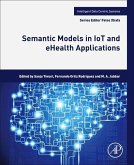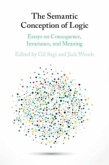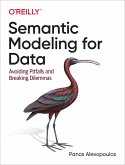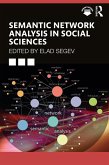Bill Cope, Mary Kalantzis, Liam Magee
Towards A Semantic Web
Connecting Knowledge in Academic Research
Bill Cope, Mary Kalantzis, Liam Magee
Towards A Semantic Web
Connecting Knowledge in Academic Research
- Broschiertes Buch
- Merkliste
- Auf die Merkliste
- Bewerten Bewerten
- Teilen
- Produkt teilen
- Produkterinnerung
- Produkterinnerung
This book addresses the question of how knowledge is currently documented, and may soon be documented in the context of what it calls 'semantic publishing'. This takes two forms: a more narrowly and technically defined 'semantic web'; as well as a broader notion of semantic publishing. This book examines the ways in which knowledge is represented in journal articles and books. By contrast, it goes on to explore the potential impacts of semantic publishing on academic research and authorship. It sets this in the context of changing knowledge ecologies: the way research is done; the way…mehr
Andere Kunden interessierten sich auch für
![Foundations of Semantic Web Technologies Foundations of Semantic Web Technologies]() Pascal Hitzler (Dayton Kno.e.sis Center at Wright State UniversityFoundations of Semantic Web Technologies91,99 €
Pascal Hitzler (Dayton Kno.e.sis Center at Wright State UniversityFoundations of Semantic Web Technologies91,99 €![The Semantic Web Explained The Semantic Web Explained]() Peter SzerediThe Semantic Web Explained64,99 €
Peter SzerediThe Semantic Web Explained64,99 €![Narrative Logic: A Semantic Analysis of the Historian's Language Narrative Logic: A Semantic Analysis of the Historian's Language]() Franklin AnkersmitNarrative Logic: A Semantic Analysis of the Historian's Language220,99 €
Franklin AnkersmitNarrative Logic: A Semantic Analysis of the Historian's Language220,99 €![Semantic Models in IoT and eHealth Applications Semantic Models in IoT and eHealth Applications]() Semantic Models in IoT and eHealth Applications131,99 €
Semantic Models in IoT and eHealth Applications131,99 €![The Semantic Conception of Logic The Semantic Conception of Logic]() The Semantic Conception of Logic35,99 €
The Semantic Conception of Logic35,99 €![Semantic Modeling for Data Semantic Modeling for Data]() Panos AlexopoulosSemantic Modeling for Data73,99 €
Panos AlexopoulosSemantic Modeling for Data73,99 €![Semantic Network Analysis in Social Sciences Semantic Network Analysis in Social Sciences]() Semantic Network Analysis in Social Sciences54,99 €
Semantic Network Analysis in Social Sciences54,99 €-
-
-
This book addresses the question of how knowledge is currently documented, and may soon be documented in the context of what it calls 'semantic publishing'. This takes two forms: a more narrowly and technically defined 'semantic web'; as well as a broader notion of semantic publishing. This book examines the ways in which knowledge is represented in journal articles and books. By contrast, it goes on to explore the potential impacts of semantic publishing on academic research and authorship. It sets this in the context of changing knowledge ecologies: the way research is done; the way knowledge is represented and; the modes of knowledge access used by researchers, students and the general public.
Produktdetails
- Produktdetails
- Verlag: Chandos Publishing / Elsevier Science & Technology
- Artikelnr. des Verlages: C2013-0-16827-4
- Englisch
- Abmessung: 233mm x 155mm x 234mm
- Gewicht: 940g
- ISBN-13: 9781843346012
- Artikelnr.: 32885762
- Verlag: Chandos Publishing / Elsevier Science & Technology
- Artikelnr. des Verlages: C2013-0-16827-4
- Englisch
- Abmessung: 233mm x 155mm x 234mm
- Gewicht: 940g
- ISBN-13: 9781843346012
- Artikelnr.: 32885762
Dr Bill Cope is Research Professor in the Department of Educational Policy Studies, University of Illinois, Urbana-Champaign, USA and Director of Common Ground Publishing. He is the co-author or editor of a number of books, including, with Angus Phillips, The Future of the Book in the Digital Age, also published by Chandos, in 2006.
Dr Mary Kalantzis is Dean of the College of Education at the University of Illinois, Urbana-Champaign and, with Bill Cope, co-author of The Powers of Literacy, University of Pittsburgh Press, 1993; Multiliteracies: Literacy Learning and the Design of Social Futures, Routledge, 2000; New Learning: Elements of a Science of Education, Cambridge University Press, 2008; and Ubiquitous Learning, University of Illinois Press, 2009.
Dr Mary Kalantzis is Dean of the College of Education at the University of Illinois, Urbana-Champaign and, with Bill Cope, co-author of The Powers of Literacy, University of Pittsburgh Press, 1993; Multiliteracies: Literacy Learning and the Design of Social Futures, Routledge, 2000; New Learning: Elements of a Science of Education, Cambridge University Press, 2008; and Ubiquitous Learning, University of Illinois Press, 2009.
List of figures and tables Figures
Authors
Chapter 1: Changing knowledge systems in the era of the social web
From print to digital text
Distributed knowledge systems: the changing role of the university
About this book
Chapter 2: Frameworks for knowledge representation
Putting things in order
Introducing the semantic web
Towards a framing of semantics
Chapter 3: The meaning of meaning: alternative disciplinary perspectives
Linguistic semantics
Cognitive semantics
Social semantics
Computational semantics
Chapter 4: What does the digital do to knowledge making?
The work of knowledge representation in the age of its digital reproducibility
The old and the new in the representation of meaning in the era of its digital reproduction
The hyperbole of the virtual
The hype in hypertext
The mechanics of rendering
A new navigational order
Multimodality
The ubiquity of recording and documentation
A shift in the balance of representational agency
A new dynamics of difference
Conclusions
Chapter 5: Books and journal articles: the textual practices of academic knowledge
The role of knowledge representation in knowledge design
The scholarly monograph
The academic journal
Future knowledge systems
Conclusions
Chapter 6: Textual representations and knowledge support-systems in research intensive networks
Introduction
Towards an ontology of knowledge
The theory of hierarchically complex systems
Research knowledge and the dynamics of hierarchically complex systems
Implications for managing research enterprises in a knowledge society
Public knowledge and the notion of a public knowledge space
Public knowledge and contextual information management practices
Public knowledge and the role of knowledge brokering
Conclusions
Appendix: a preliminary ontology for research knowledge support;
Chapter 7: An historical introduction to formal knowledge systems
Pre-modernity: logical lineages
Early modernity: the mechanisation of thought
Crises in modernity: the order of logic and the chaos of history
Chapter 8: Contemporary dilemmas: tables versus webs
Ordering the world by relations
Early threads of the semantic web
Shifting trends or status quo?
Systems of knowledge: modern and postmodern
Knowledge systems in social context
Chapter 9: Upper-level ontologies
A survey of upper-level ontologies
A dialogical account of ontology engineering
Conclusions: assessing commensurability
Appendix: upper-level ontologies- supplementary data
Chapter 10: Describing knowledge domains: a case study of biological ontologies
Biological ontologies
Biological cultures, ontological cultures
Ontological objects
Towards compromise: ontologies in practice
Chapter 11: On commensurability
A world of 'material intangibles': social structures, conceptual schemes and cultural perspectives
De-structuring critiques: struggling with systems, structures and schemes
Interlude: constructions of science
Elastic structures: linking the linguistic, the cognitive and the social
Towards a framework.
Chapter 12: A framework for commensurability
What to measure-describing 'ontological cultures'
Presenting a framework for commensurability
Applying the framework
Chapter 13: Creating an interlanguage of the social web
The discursive practice of markup
Structural markup
Metamarkup: developing markup frameworks
Developing an interlanguage mechanism
Schema alignment for semantic publishing: the example of Common Ground Markup Language
What tagging schem
Authors
Chapter 1: Changing knowledge systems in the era of the social web
From print to digital text
Distributed knowledge systems: the changing role of the university
About this book
Chapter 2: Frameworks for knowledge representation
Putting things in order
Introducing the semantic web
Towards a framing of semantics
Chapter 3: The meaning of meaning: alternative disciplinary perspectives
Linguistic semantics
Cognitive semantics
Social semantics
Computational semantics
Chapter 4: What does the digital do to knowledge making?
The work of knowledge representation in the age of its digital reproducibility
The old and the new in the representation of meaning in the era of its digital reproduction
The hyperbole of the virtual
The hype in hypertext
The mechanics of rendering
A new navigational order
Multimodality
The ubiquity of recording and documentation
A shift in the balance of representational agency
A new dynamics of difference
Conclusions
Chapter 5: Books and journal articles: the textual practices of academic knowledge
The role of knowledge representation in knowledge design
The scholarly monograph
The academic journal
Future knowledge systems
Conclusions
Chapter 6: Textual representations and knowledge support-systems in research intensive networks
Introduction
Towards an ontology of knowledge
The theory of hierarchically complex systems
Research knowledge and the dynamics of hierarchically complex systems
Implications for managing research enterprises in a knowledge society
Public knowledge and the notion of a public knowledge space
Public knowledge and contextual information management practices
Public knowledge and the role of knowledge brokering
Conclusions
Appendix: a preliminary ontology for research knowledge support;
Chapter 7: An historical introduction to formal knowledge systems
Pre-modernity: logical lineages
Early modernity: the mechanisation of thought
Crises in modernity: the order of logic and the chaos of history
Chapter 8: Contemporary dilemmas: tables versus webs
Ordering the world by relations
Early threads of the semantic web
Shifting trends or status quo?
Systems of knowledge: modern and postmodern
Knowledge systems in social context
Chapter 9: Upper-level ontologies
A survey of upper-level ontologies
A dialogical account of ontology engineering
Conclusions: assessing commensurability
Appendix: upper-level ontologies- supplementary data
Chapter 10: Describing knowledge domains: a case study of biological ontologies
Biological ontologies
Biological cultures, ontological cultures
Ontological objects
Towards compromise: ontologies in practice
Chapter 11: On commensurability
A world of 'material intangibles': social structures, conceptual schemes and cultural perspectives
De-structuring critiques: struggling with systems, structures and schemes
Interlude: constructions of science
Elastic structures: linking the linguistic, the cognitive and the social
Towards a framework.
Chapter 12: A framework for commensurability
What to measure-describing 'ontological cultures'
Presenting a framework for commensurability
Applying the framework
Chapter 13: Creating an interlanguage of the social web
The discursive practice of markup
Structural markup
Metamarkup: developing markup frameworks
Developing an interlanguage mechanism
Schema alignment for semantic publishing: the example of Common Ground Markup Language
What tagging schem
List of figures and tables Figures
Authors
Chapter 1: Changing knowledge systems in the era of the social web
From print to digital text
Distributed knowledge systems: the changing role of the university
About this book
Chapter 2: Frameworks for knowledge representation
Putting things in order
Introducing the semantic web
Towards a framing of semantics
Chapter 3: The meaning of meaning: alternative disciplinary perspectives
Linguistic semantics
Cognitive semantics
Social semantics
Computational semantics
Chapter 4: What does the digital do to knowledge making?
The work of knowledge representation in the age of its digital reproducibility
The old and the new in the representation of meaning in the era of its digital reproduction
The hyperbole of the virtual
The hype in hypertext
The mechanics of rendering
A new navigational order
Multimodality
The ubiquity of recording and documentation
A shift in the balance of representational agency
A new dynamics of difference
Conclusions
Chapter 5: Books and journal articles: the textual practices of academic knowledge
The role of knowledge representation in knowledge design
The scholarly monograph
The academic journal
Future knowledge systems
Conclusions
Chapter 6: Textual representations and knowledge support-systems in research intensive networks
Introduction
Towards an ontology of knowledge
The theory of hierarchically complex systems
Research knowledge and the dynamics of hierarchically complex systems
Implications for managing research enterprises in a knowledge society
Public knowledge and the notion of a public knowledge space
Public knowledge and contextual information management practices
Public knowledge and the role of knowledge brokering
Conclusions
Appendix: a preliminary ontology for research knowledge support;
Chapter 7: An historical introduction to formal knowledge systems
Pre-modernity: logical lineages
Early modernity: the mechanisation of thought
Crises in modernity: the order of logic and the chaos of history
Chapter 8: Contemporary dilemmas: tables versus webs
Ordering the world by relations
Early threads of the semantic web
Shifting trends or status quo?
Systems of knowledge: modern and postmodern
Knowledge systems in social context
Chapter 9: Upper-level ontologies
A survey of upper-level ontologies
A dialogical account of ontology engineering
Conclusions: assessing commensurability
Appendix: upper-level ontologies- supplementary data
Chapter 10: Describing knowledge domains: a case study of biological ontologies
Biological ontologies
Biological cultures, ontological cultures
Ontological objects
Towards compromise: ontologies in practice
Chapter 11: On commensurability
A world of 'material intangibles': social structures, conceptual schemes and cultural perspectives
De-structuring critiques: struggling with systems, structures and schemes
Interlude: constructions of science
Elastic structures: linking the linguistic, the cognitive and the social
Towards a framework.
Chapter 12: A framework for commensurability
What to measure-describing 'ontological cultures'
Presenting a framework for commensurability
Applying the framework
Chapter 13: Creating an interlanguage of the social web
The discursive practice of markup
Structural markup
Metamarkup: developing markup frameworks
Developing an interlanguage mechanism
Schema alignment for semantic publishing: the example of Common Ground Markup Language
What tagging schem
Authors
Chapter 1: Changing knowledge systems in the era of the social web
From print to digital text
Distributed knowledge systems: the changing role of the university
About this book
Chapter 2: Frameworks for knowledge representation
Putting things in order
Introducing the semantic web
Towards a framing of semantics
Chapter 3: The meaning of meaning: alternative disciplinary perspectives
Linguistic semantics
Cognitive semantics
Social semantics
Computational semantics
Chapter 4: What does the digital do to knowledge making?
The work of knowledge representation in the age of its digital reproducibility
The old and the new in the representation of meaning in the era of its digital reproduction
The hyperbole of the virtual
The hype in hypertext
The mechanics of rendering
A new navigational order
Multimodality
The ubiquity of recording and documentation
A shift in the balance of representational agency
A new dynamics of difference
Conclusions
Chapter 5: Books and journal articles: the textual practices of academic knowledge
The role of knowledge representation in knowledge design
The scholarly monograph
The academic journal
Future knowledge systems
Conclusions
Chapter 6: Textual representations and knowledge support-systems in research intensive networks
Introduction
Towards an ontology of knowledge
The theory of hierarchically complex systems
Research knowledge and the dynamics of hierarchically complex systems
Implications for managing research enterprises in a knowledge society
Public knowledge and the notion of a public knowledge space
Public knowledge and contextual information management practices
Public knowledge and the role of knowledge brokering
Conclusions
Appendix: a preliminary ontology for research knowledge support;
Chapter 7: An historical introduction to formal knowledge systems
Pre-modernity: logical lineages
Early modernity: the mechanisation of thought
Crises in modernity: the order of logic and the chaos of history
Chapter 8: Contemporary dilemmas: tables versus webs
Ordering the world by relations
Early threads of the semantic web
Shifting trends or status quo?
Systems of knowledge: modern and postmodern
Knowledge systems in social context
Chapter 9: Upper-level ontologies
A survey of upper-level ontologies
A dialogical account of ontology engineering
Conclusions: assessing commensurability
Appendix: upper-level ontologies- supplementary data
Chapter 10: Describing knowledge domains: a case study of biological ontologies
Biological ontologies
Biological cultures, ontological cultures
Ontological objects
Towards compromise: ontologies in practice
Chapter 11: On commensurability
A world of 'material intangibles': social structures, conceptual schemes and cultural perspectives
De-structuring critiques: struggling with systems, structures and schemes
Interlude: constructions of science
Elastic structures: linking the linguistic, the cognitive and the social
Towards a framework.
Chapter 12: A framework for commensurability
What to measure-describing 'ontological cultures'
Presenting a framework for commensurability
Applying the framework
Chapter 13: Creating an interlanguage of the social web
The discursive practice of markup
Structural markup
Metamarkup: developing markup frameworks
Developing an interlanguage mechanism
Schema alignment for semantic publishing: the example of Common Ground Markup Language
What tagging schem








